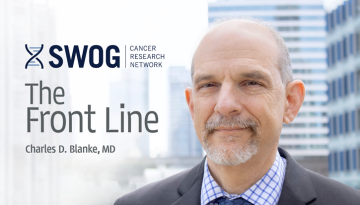The Research World’s Response to the Pandemic
Throw a global public health emergency at those involved in conducting research, and you get…more research. A lot of it. Innumerable studies on the coronavirus – its causes and effects, how to test for it, and possible treatments – have launched in just a few months’ time. The trials come from a wide variety of venues – studies from industry, academia, and government researchers are under development and review. Why are we talking about it here? Many are cancer-focused or cancer-related.
If you’re looking to enroll patients to a coronavirus intervention trial, a good resource is the COVID-19 Treatment Hub, a service of the Reagan-Udall Foundation, the nonprofit supporting the U.S. Food and Drug Administration (FDA). The hub is a searchable directory of more than 1,000 trials. You can search by location, condition, and drug or company name. Trials run by biotech and pharmaceutical companies are listed, as well as those run by academic investigators at places such as U Penn, Harvard, Cleveland Clinic, and Columbia. What’s particularly interesting about the hub is that it’s international in reach, so you can see efforts in Europe, Asia, and the Middle East.
I also wanted to point out a handful of specific COVID studies. Note: Each title is a live link, so you can be easily directed to a website for more information.
Accelerating COVID-19 Therapeutic Interventions and Vaccines (ACTIV) – This project is run by the National Institutes of Health (NIH) and the Foundation for the NIH, and represents Dr. Francis Collins’ desire to leverage government infrastructure, industry agents, and academic expertise to speed coronavirus research. ACTIV is a public-private partnership that includes the FDA and the U.S. Centers for Disease Control and Prevention, as well as more than a dozen pharmaceutical companies. It aims to prioritize vaccine and drug candidates, streamline clinical trials, coordinate regulatory processes, and optimize research assets. Importantly, we’ll be involved through the NCTN and NCORP. Stay tuned.
American Society of Hematology (ASH) Research Collaborative’s COVID-19 Registry for Hematologic Malignancy – This project is led by the ASH Research Collaborative, a nonprofit created by ASH. The ASH COVID Registry captures data from people being treated for blood cancers who are diagnosed with COVID. Demographic, symptom, treatment and other data is quickly de-identified and made HIPAA compliant and is sent out to clinicians in the form of near-real time summaries to aid treatment decisions. Registry data can be easily transmitted online.
ASCO Survey on COVID-19 and Oncology Registry (ASCO Registry) – This project aimsto uncover patterns of COVID-19 symptoms and the severity of the disease among patients with cancer. It also is designed to show how COVID infections affect patient outcomes and cancer care delivery. The registry will not only collect point-in-time data on patients, but also longitudinal data through the end of 2021. The registry is open to all U.S. oncology practices, and accepts data from COVID-positive patients with all types of cancer who are receiving any kind of treatment. Practices that take part in the ASCO Registry will be asked to fill out a baseline survey on each patient, then complete follow-up surveys on health status, treatments, and outcomes.
COVID-19 and Cancer Consortium (CCC19) – This grassroots project grew out of conversation on Twitter, and now includes over 100 cancer centers, universities, and health systems. Built on REDCap software developed by Vanderbilt University, the CCC19 registry was one of the first major COVID studies to launch, with SWOG Executive Officer Dr. Gary Lyman as one of its founders. The aim is to understand the unique effects of COVID-19 on patients with cancer, as well as cancer survivors, by capturing data on patient demographics, clinicopathologic factors, coronavirus diagnosis and treatment details, and health care provider information. With the recent addition of ESMO President Dr. Solange Peters of France to the registry’s steering committee, CCC19 now includes European collaborators.
Cancer and COVID-19 Longitudinal Cohort – This NCI project aims to build a nationwide cohort of 2,000 patients with COVID-19 and cancer. It’s scheduled to start accruing patients by the end of next week, and accrual will continue through December 1. Like the ACTIV study, this initiative will use the NCTN and NCORP – particularly the minority and underserved NCORP groups – to enroll patients. Sites will get full NCI reimbursement for patients they accrue. The aim of the study is to create a set of data and blood samples from a diverse group of patients that can be mined for future research studies. Data will be gathered on patients throughout the course of their COVID illness, and a subset will be followed for over a year to understand the impact of COVID on survivorship.
Finally, I want to note an interesting wrinkle in COVID research.
One drug currently being tested to prevent coronavirus infection is the BCG vaccine. As SWOG stalwarts know, BCG, a tuberculosis treatment, was successfully tested in SWOG trials in the 1980s as a therapy for bladder cancer. Our 1991 publication of results from S8216 in the New England Journal of Medicine helped set the drug’s use as the standard of care for early stage, non-muscle invasive disease. Now BCG is being tested as an immune enhancer in trials in Australia and the Netherlands. Everything old is new again.
Other Recent Stories



